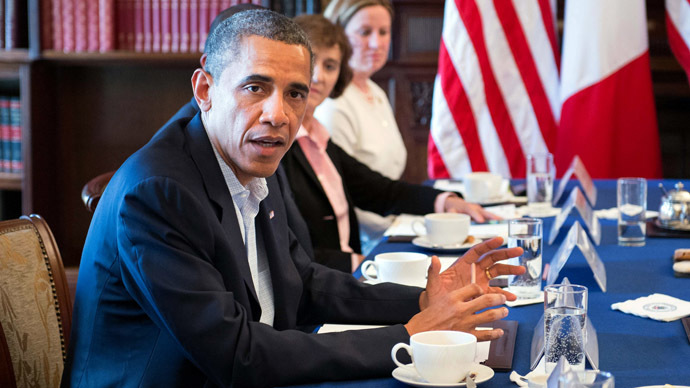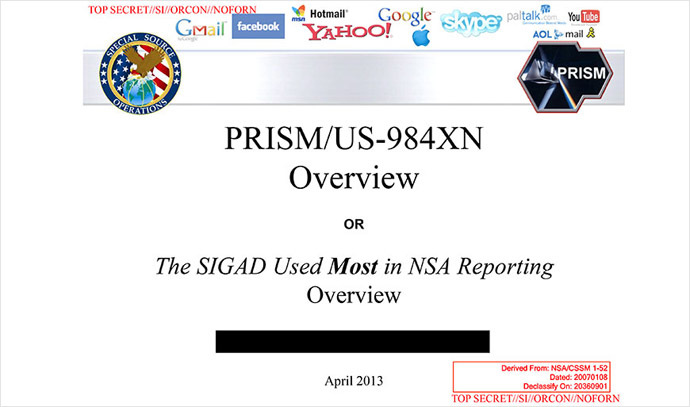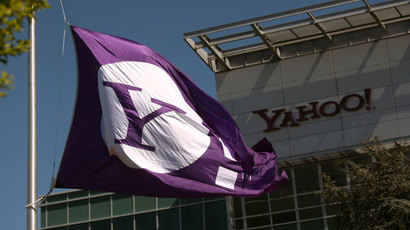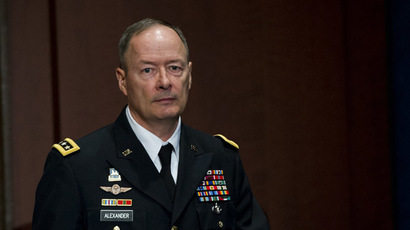Obama's 'transparent' NSA interview points debunked

Despite reports indicating the opposite US President Barack Obama has continued to perpetrate the vague assertion that the controversial NSA surveillance programs, primarily PRISM, are responsible for stopping a major terrorist attack in New York City.
American officials have maintained that the National Security Agency has been “transparent” in its explanation of mass surveillance policies that are quietly reviewed and approved by a secret court after secret requests from law enforcement agencies.
President Obama, during an interview on PBS Monday night, claimed that Americans are “not getting the complete story” after a leak from former NSA employee exposed the widespread domestic monitoring.
Before an agency begins leafing through an individual’s phone records or Internet history, according to US officials, they are required to take the case before a court created by the Foreign Intelligence Surveillance Act (FISA). These FISA courts, while meeting in secret and keeping the number of disclosures classified, have denied only ten out of more than 20,000 requests put in since September 11, 2001.
When asked if the FISA courts are effectively a rubber stamp for law enforcement and the federal government, Obama said “the number of requests is surprisingly small” and “folks don’t go with a query unless they’ve got a pretty good suspicion” that he intended target is involved in illegal activity.
Obama bemoaned media’s assertion that he had fallen from his liberal hero status to that of a kind of next Dick Cheney, the notoriously secretive vice president under George W. Bush, who pushed for greater federal power without the burden of public transparency.
Of the NSA electronic domestic spying program, Obama said, “it is transparent” in an interview with Charlie Rose of PBS. “That’s why we set up the FISA court…The whole point of my concern, before I was president – because some people say, ‘Well Obama was this raving liberal before. Now he’s Dick Cheney.’”
“My concern has always been not that we shouldn’t do intelligence gathering to prevent terrorism, but rather are we setting up a system of checks and balances? So, on this telephone program, you’ve got a federal court with independent federal judges overseeing the entire program. And you’ve got Congress overseeing the program, not just the intelligence committee and not just the judiciary committee – but all of Congress had available to it before the last reauthorization [of the 2001 Patriot Act, which expanded the powers of the FISA court] exactly how this program works.”
Obama also echoed the claims of government officials who asserted that they had foiled dozens of terrorist plots through information gathered via the various surveillance programs. The president that implied Najibullah Zazi, who was arrested before he could detonate a bomb in the New York City subway, was caught as a result of warrantless surveillance.
The explanation was repeated by Senators Dianne Feinstein and
Mike Rogers and part of a national intelligence declassification
meant to shift public opinion on the NSA’s PRISM program. While
it may be a convenient story, though, lawmakers frequently forget
to mention that the email that led to Zazi’s capture and eventual
prosecution could have been captured without PRISM, as the NSA
program is known.

Under the law at the time the FBI had the authority to monitor the email accounts of people linked to terrorists. Zazi was identified when British intelligence found a computer containing an email from Zazi to Pakistani terrorists, at which point the government could have gone to a judge for a warrant.
“To get a warrant, the law requires that the government show that the target is a suspected member of a terrorist group or foreign government, something that had been well established at that point in the Zazi case,” the Associated Press reported earlier this month.
“In using Zazi to defend the surveillance program, government officials have further confused things by misstating key details about the plot,” the agency said at the time.
Critics have not only levied their complaints at politicians, but at mainstream media outlets for failing to ask the relevant questions about the NSA programs. Charlie Rose, in particular, has been chided for not pushing Obama to provide evidence for his NSA claims while 24-hour news channels including CNN seem to have devoted more coverage to NSA leaker Edward Snowden’s personality than to the information he made public.
Snowden himself digitally emerged from hiding Monday to answer reader-submitted questions on TheGuardian.com, where he lamented the media’s failings.
“Journalists should ask a specific question: since these programs began operation shortly after September 11th, how many terrorist attacks were prevented SOLELY by information derived from this suspicion-less surveillance that could not be gained via any other source?” Snowden wrote.
“Initially I was very encouraged. Unfortunately, the mainstream media now seems far more interested in what I said when I was 17 or what my girlfriend looks like rather than, say, the largest program of suspicion-less surveillance in human history.”














